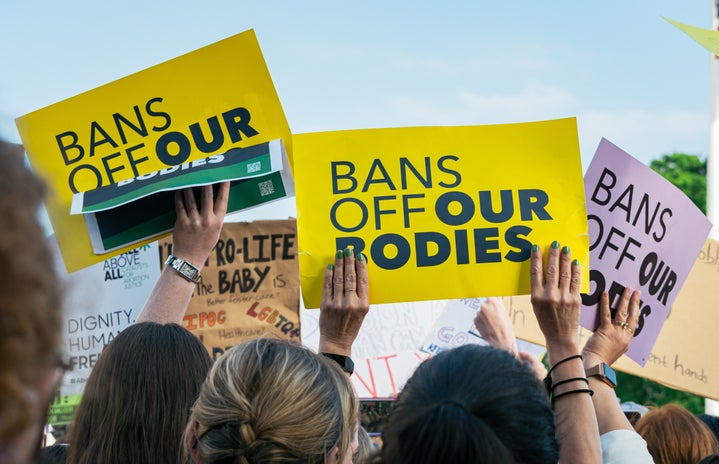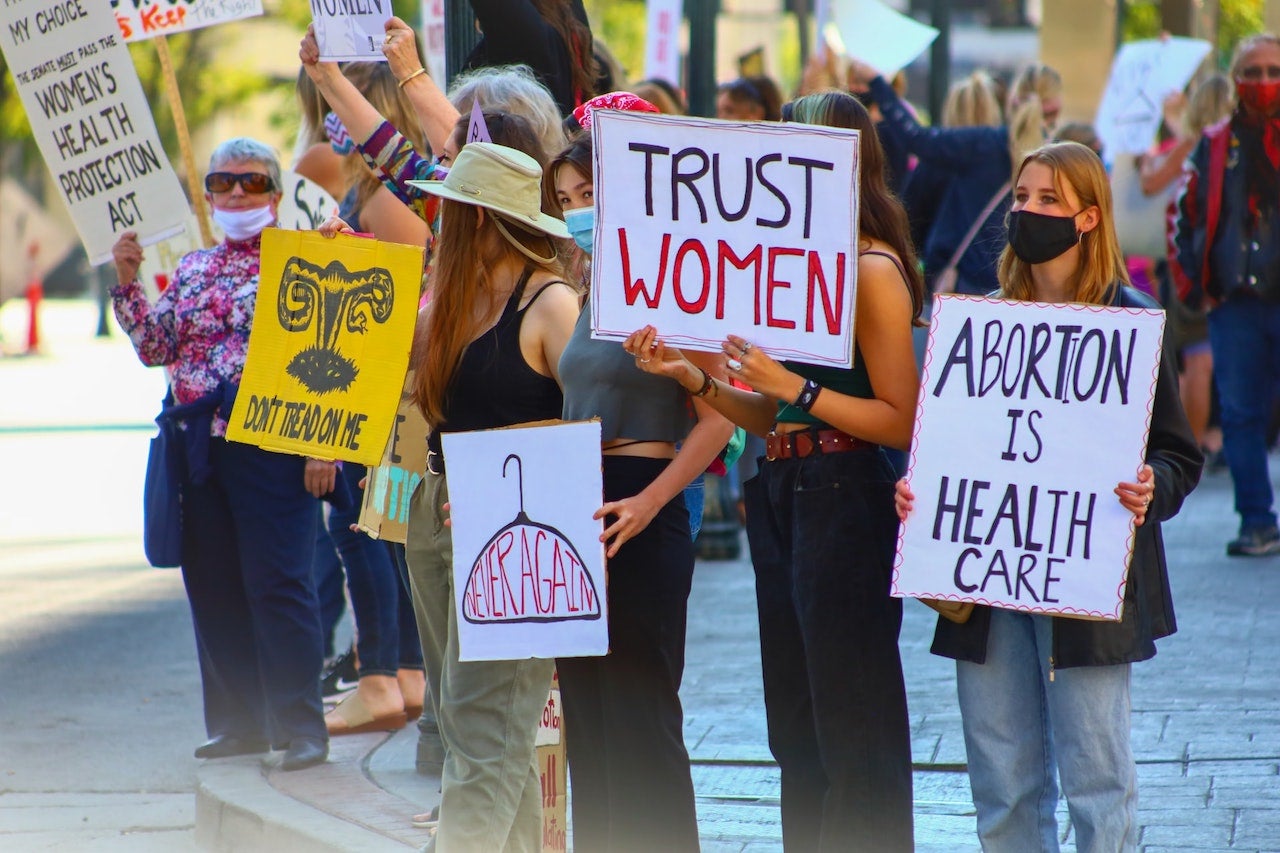I want to preface this article by saying that it is going to be biased towards the pro-choice, pro-woman, pro-uterus standpoint. This is not a fully comprehensive guide on *everything* one needs to know right now, either. There’s a lot that revolves around this issue, so I encourage readers to seek further viewpoints and news articles for more.
I usually try to write about news topics in a more journalistic manner, from an unbiased standpoint where I just present the facts. But right now, I am filled with heartbreak and wish to write in support of everyone struggling right now.
The news has been flooded with the Supreme Court’s decision to overturn Roe v. Wade. It’s all we’re seeing on our phones and computers, all we’re hearing from the people around us.
It’s an inescapable truth – the right to an abortion is no longer federally protected.
What exactly does this mean? This article by The New Yorker concisely explains what the decision means for uterus owners in America (and it’s pretty bleak).
If you’re thinking of speaking out against this decision or attending a protest, there are some things you need to know beforehand to keep yourself safe.
I know this is a stressful time, so I’m here to try to help prepare and support you all.
What to know before you go.
Please prepare yourself before you head out to a peaceful protest and make sure you have everything you need.
Bring a small, preferably not bulky backpack or fanny pack to carry your supplies. It keeps your arms free and secures your goods.
Pack the largest water bottle you’ve got. It’s summer right now, so it’s hot and you may be marching. If things take a turn for the worse, water is also going to help you if you get tear gas or pepper spray in your eyes, according to Wired.
Wired also suggests bringing a face covering, for your protection and safety. Not only does COVID-19 still exist but covering part of your face will help protect your identity.
Snacks! Bring food that will keep you going and energize you.
Other things to consider: sunscreen, clothing and a change of clothes, comfortable shoes, cash, a portable charger, and first aid supplies. There’s more you can pack to plan ahead for anything, which you can find in this article here.
If you wear contacts – don’t. Wear your glasses.
Be mindful of your phone. Unfortunately, there are tracking services on phones that can sometimes continue to work even if the phone is off. If you want to be 100% safe, I recommend leaving it at home or disabling tracking as best as you can. Wired also suggests turning off biometric and face ID unlocking options.
Please don’t go alone if you can help it. Safety is number one here. If you do go alone, contact someone to make sure at least one person knows your location.
Plan for anything. Establish meeting points for you and your friends to rendezvous at if anything happens or you get separated from your group / friend.
Please check out Wired’s article for more.
Refresh yourself on your rights.
Please please please review your rights if you’re thinking of attending a protest (or making statements online).
According to the ACLU, “The First Amendment protects your right to assemble and express your views through protest. However, police and other government officials are allowed to place certain narrow restrictions on the exercise of speech rights.”
Are you organizing a protest? I recommend checking out this page here for more information on how to that.
Are you attending a protest? Feel free to check out this section here for more.
What about photographing or videoing protests? This section details your rights for that, too. Police cannot confiscate or demand you stop your documentation unless they have a warrant to do so. They also can’t delete your work.
They key is to maintain a peaceful protest. Enter in that mindset and leave immediately if things feel unsafe to you.
What to do if you have been stopped by police while protesting:
If you are at a protest and get stopped by police, stay calm. Keep your hands visible and don’t resist, according to the ACLU.
What else should you do? The ACLU says:
- Ask if you are free to leave. If they say yes, calmly leave.
- If you’re under arrest, you have the right to ask why. You can also remain silent and ask for a lawyer ASAP. Don’t say anything, don’t sign anything, don’t do anything without your lawyer.
- You have the right to make a local call – and if it’s your lawyer, the police cannot listen.
- You may get patted down – stay calm
- You do not have to consent to a search of yourself or your belongings – if you do consent, it may affect you later
Need more? Check out the ACLU website here.
have your rights been violated?
Do you suspect your rights have been violated? Document, document, document.
Take photos. Write down everything you can remember, ask witnesses for their contact information, document injuries, patrol car numbers and badge numbers. You’ll need all this to help you file a complaint.
You don’t have to protest to help.
I know protesting isn’t for everyone, especially since police brutality is a thing that exists. Anything can happen and your safety could be at risk.
There are other ways of supporting the movement against this decision, like sending donations to ACLU and Planned Parenthood, as well as other organizations who support abortion rights.
If you’re able and comfortable, share your story. Talk to family and friends about it. Vote. Volunteer. Provide resources and support as you can. As tempting as it feels right now, don’t stock up on any related pills or supplies. It’s only going to limit those things to any who may need them asap.
If you’re a student on a campus, seek out your university’s resources and find out what they’re doing to help (also take advantage of any healthcare they provide to their students, too).
Establish a support system and be sure to take care of yourself.
Check out Cosmopolitan’s article for more ways to get involved- it’s one of my favorites.
what else should you know?
Things are likely going to get worse as states begin to enact their own laws concerning abortion and interpretation of the Constitution. Many states have already placed bans, with more to follow. See NPR’s article for more deets.
So what’s next?
Pregnant people and those of childrearing age are at high risk. It has been estimated that up to 54% of women will have to travel farther to seek an abortion, according to Nature.com. This comes with many personal, physical, and financial risks. Not everyone will be able to seek outside help to find a provider and the expected outpouring may be overwhelming to providers who are able to help.
That’s just one facet of a multi-dimensional issue.
There are also a lot of unanswered questions following this SCOTUS decision. It is unclear how courts will handle the access of information like travel records, period tracking apps and anything in between if some states begin to convict women for abortions or miscarriages.
Many are urging people to go as analog as possible and use encrypted messaging services, which feels very dystopian and conspiracy theory-esque…leaving the rest of us to question if all this information storing and tracking can actually get used against us now.
Many states are talking about restricting or banning abortion pills, birth control, and there are whispers of entering LGBTQIA+ rights territory. I recommend monitoring the news to stay updated, because I have a feeling that this is only the beginning.
Something I saw recently on social media stuck with me, saying, “Honor your feelings and arm yourself with the facts.”
So, if you plan to gear up and head out to face this post-Roe world, listen to yourself and get educated. Women being born now will have less rights than what their moms and grandmas had for the majority of their lives – and if that doesn’t spook you, you’re not paying attention.
*Editor’s note: This article does not necessarily reflect beliefs held by HerCampus as a company and should not be interpreted as such.


